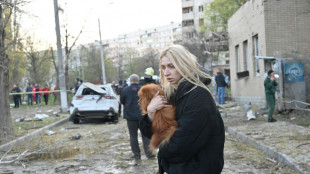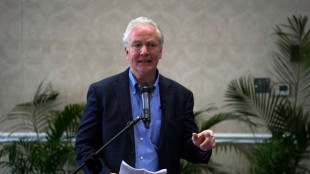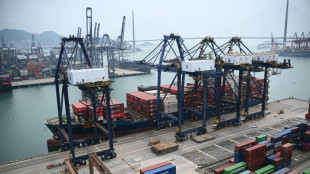-
 Arsenal's Havertz could return for Champions League final
Arsenal's Havertz could return for Champions League final
-
US officials split on Ukraine truce prospects

-
 Client brain-dead after Paris cryotherapy session goes wrong
Client brain-dead after Paris cryotherapy session goes wrong
-
Flick demands answers from La Liga for 'joke' schedule

-
 'Maddest game' sums up Man Utd career for Maguire
'Maddest game' sums up Man Utd career for Maguire
-
Trial opens for students, journalists over Istanbul protests

-
 Gaza rescuers say Israeli strikes kill 24 after Hamas rejects truce proposal
Gaza rescuers say Israeli strikes kill 24 after Hamas rejects truce proposal
-
'Really stuck': Ukraine's EU accession drive stumbles

-
 'Not the time to discuss future', says Alonso amid Real Madrid links
'Not the time to discuss future', says Alonso amid Real Madrid links
-
74 killed in deadliest US attack on Yemen, Huthis say

-
 Southgate's ex-assistant Holland fired by Japan's Yokohama
Southgate's ex-assistant Holland fired by Japan's Yokohama
-
Vance meets Meloni in Rome before Easter at the Vatican

-
 Ryan Gosling to star in new 'Star Wars' film
Ryan Gosling to star in new 'Star Wars' film
-
Hamas calls for pressure to end Israel's aid block on Gaza

-
 Russia says Ukraine energy truce over, US mulls peace talks exit
Russia says Ukraine energy truce over, US mulls peace talks exit
-
58 killed in deadliest US strike on Yemen, Huthis say

-
 Museums rethink how the Holocaust should be shown
Museums rethink how the Holocaust should be shown
-
Three dead after deadly spring storm wreaks havoc in the Alps

-
 No need for big changes at Liverpool, says Slot
No need for big changes at Liverpool, says Slot
-
Bloody Philippine passion play sees final performance of veteran 'Jesus'

-
 New US envoy prays, delivers Trump 'peace' message at Western Wall
New US envoy prays, delivers Trump 'peace' message at Western Wall
-
Postecoglou sticking around 'a little longer' as Spurs show fight in Frankfurt

-
 US threatens to withdraw from Ukraine talks if no progress
US threatens to withdraw from Ukraine talks if no progress
-
Tears and defiance in Sumy as Russia batters Ukraine border city

-
 Russia rains missiles on Ukraine as US mulls ending truce efforts
Russia rains missiles on Ukraine as US mulls ending truce efforts
-
Tokyo leads gains in most Asian markets on trade deal hopes

-
 Two missing after deadly spring snowstorm wreaks havoc in the Alps
Two missing after deadly spring snowstorm wreaks havoc in the Alps
-
'War has taken everything': AFP reporter returns home to Khartoum

-
 US strikes on Yemen fuel port kill 38, Huthis say
US strikes on Yemen fuel port kill 38, Huthis say
-
Slegers targets Lyon scalp in pursuit of Arsenal European glory

-
 'Defend ourselves': Refugee girls in Kenya find strength in taekwondo
'Defend ourselves': Refugee girls in Kenya find strength in taekwondo
-
China's manufacturing backbone feels Trump trade war pinch

-
 Sri Lankans throng to Kandy for rare display of Buddhist relic
Sri Lankans throng to Kandy for rare display of Buddhist relic
-
Chinese vent anger at Trump's trade war with memes, mockery

-
 Heartbroken Brits abandon pets as living costs bite
Heartbroken Brits abandon pets as living costs bite
-
Mongolian LGBTQ youth fight for recognition through music, comedy

-
 Cash crunch leaves Syrians queueing for hours to collect salaries
Cash crunch leaves Syrians queueing for hours to collect salaries
-
Lyon left to regroup for Champions League bid after painful European exit

-
 Unravelling Real Madrid face Athletic Bilbao Liga test
Unravelling Real Madrid face Athletic Bilbao Liga test
-
Napoli disturbing buoyant Inter's peace in Serie A Easter bonanza

-
 Disappointed Dortmund chase consistency with Europe at stake
Disappointed Dortmund chase consistency with Europe at stake
-
Asian markets mixed as traders track tariff talks

-
 Yan and Buhai share lead at LA Championship
Yan and Buhai share lead at LA Championship
-
Under fire at debate, Canada PM Carney tries to focus on Trump

-
 Liverpool poised for Premier League coronation, Leicester, Ipswich for relegation
Liverpool poised for Premier League coronation, Leicester, Ipswich for relegation
-
India's elephant warning system tackles deadly conflict

-
 US senator meets wrongfully deported Salvadoran migrant
US senator meets wrongfully deported Salvadoran migrant
-
Gustavo Dudamel: the superstar conductor building bridges to pop

-
 Japan rice prices soar as core inflation accelerates
Japan rice prices soar as core inflation accelerates
-
US unveils new port fees for Chinese-linked ships

EU Pledges €800 Billion for Defence to Deter Russia
The European Union has unveiled an ambitious plan to allocate €800 billion towards bolstering its defence capabilities, a move widely interpreted as a strategic response to escalating tensions with Russia. Announced by European Commission President Ursula von der Leyen, this initiative aims to transform the EU into a formidable "defence union," shifting its economic priorities towards what some analysts have dubbed a "war economy." The decision, detailed in a recent strategic white paper, comes amid growing concerns over Russia’s military assertiveness, particularly following its ongoing aggression in Ukraine and perceived threats to NATO’s eastern flank.
The €800 billion package, to be rolled out over the coming years, includes €150 billion in EU loans and significant exemptions from the bloc’s stringent debt rules, allowing member states to finance military enhancements without breaching fiscal limits. According to sources cited by the Deutsche Presse-Agentur (DPA), the funds will target seven key areas, including air defence, cyber capabilities, and military intelligence, aiming to close critical gaps in Europe’s defence infrastructure. "If Europe wants to avoid war, it must be prepared for war," the white paper states, echoing a sentiment of deterrence through strength.
Russia’s reaction has been swift and critical. Kremlin spokesperson Dmitry Peskov accused Europe of "aggressive militarism," a charge that carries irony given Russia’s own allocation of nearly 40% of its state budget to military spending in 2025. Russian President Vladimir Putin has overseen a dramatic shift to a war economy since the invasion of Ukraine in 2022, with the country reportedly producing three million artillery shells annually—outpacing the combined output of NATO’s 32 members. This disparity in production capacity has fuelled European fears that Russia could sustain prolonged conflicts, potentially eyeing targets beyond Ukraine, such as the Baltic states or Poland.
The EU’s move also reflects unease over its reliance on the United States, particularly following uncertainties surrounding American support under a potential Donald Trump presidency. While earlier drafts of the white paper explicitly warned of over-dependence on the US, these references were softened in the final version after interventions from von der Leyen’s cabinet, as reported by DPA. Nonetheless, the €800 billion commitment underscores a push for strategic autonomy, with investments channelled into European-made defence systems to reduce external vulnerabilities.
Critics within the EU, however, question the feasibility and implications of such a shift. Transforming a civilian economy into one geared for war requires significant market interventions, a prospect that has raised doubts about political willingness and economic sustainability. The precedent of the United States during World War II—where private industries were placed under strict government oversight—looms large, yet Europe’s fragmented political landscape may complicate such coordination. Furthermore, the redirection of resources comes at a time when the EU is already grappling with energy transitions and post-pandemic recovery, with the €672 billion European Recovery Fund serving as a recent benchmark for large-scale spending.
Public sentiment, particularly in Germany, reflects growing anxiety. A Shell Youth Study cited by rbb-online.de found that the threat of war is now the top concern among young Germans, with fears of conscription and displacement driving calls for preparedness. NATO’s ongoing "Steadfast Defender" exercises, involving 90,000 troops, and the upcoming "Nordic Response" manoeuvre underscore this urgency, simulating defensive operations against a Russian incursion.
While the €800 billion figure is a political statement of intent, its implementation remains uncertain. Analysts note that it may take months, if not years, for funds to translate into tangible military assets. For now, the EU hopes this bold financial pledge will serve as a deterrent, projecting strength to Moscow while navigating internal divisions and external dependencies. Whether it instils fear in Russia or merely galvanises Europe’s resolve, the stakes for the continent’s security have rarely been higher.

EU: Record number of births!

EU: Military spending is on the rise!

Crisis: EU bicycle production drops!

EU: Foreign-controlled enterprises?

EU DECODED: Deforestation law’s trade-offs

Underwater Wi-Fi: European startups woo investors

Trump's US support for Ukraine and China?

Cultural year 2024: between Qatar and Morocco

Planning a wellness break? Poland!

Studio Kremlin: creative co-working in Paris

Culture: Serbia’s architectural marvels




